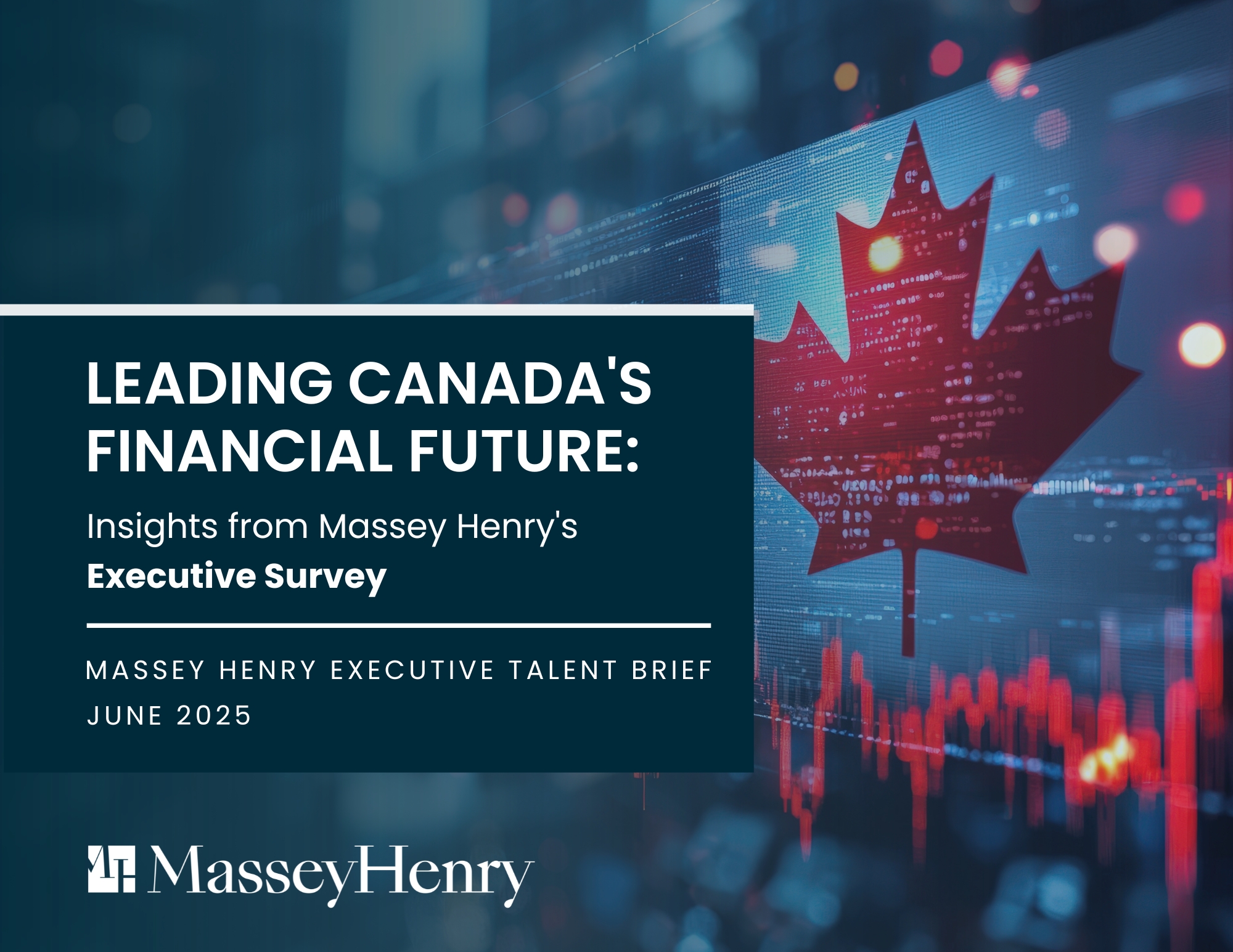
Executive Summary
As Canada’s financial institutions grapple with market volatility, global competition, and shifting workforce expectations, executive leadership is undergoing a fundamental transformation.
To better understand how leaders are responding to today’s strategic and talent demands, Massey Henry conducted a proprietary survey of over 100 senior executives across Canada’s financial services sector.
This exclusive research reveals the critical leadership capabilities, evolving hiring strategies, and organizational imperatives shaping the future of financial services in Canada.
What Leaders Are Telling Us
Leadership is being redefined by the need for innovation, agility, and crisis resilience.
Talent strategies are shifting — but not uniformly — toward adaptability and values alignment.
While Canada’s strengths as a country remain attractive to leaders, they may not be enough to retain world-class executive talent.
Organizations must invest in succession planning at home, while advocating for Canadian talent and interests globally.
Canada’s status as a financial hub inspires confidence — but that confidence is conditional on bold policy direction and a more robust innovation ecosystem.
As Canadian financial institutions navigate ongoing economic uncertainty and global disruption, strong, future-focused leadership has never been more critical.
The insights revealed in Massey Henry’s executive survey — and further explored at the firm’s recent roundtable on this topic, which I had the opportunity to
attend — underscore a clear consensus on the leadership imperatives, talent gaps, and strategic opportunities that will shape the next era of Canadian financial services.
Our latest report examines key themes shaping the future of executive leadership in Canada with insights from our proprietary survey.
Introduction
Our proprietary research explored five key themes shaping the future of executive leadership in Canada:
1) Critical Leadership Skills
The competencies needed to lead through complexity.
2) Talent Strategies
How hiring and leadership development are evolving.
3) The Role of Canadian Organizations
How domestic organizations can shape future-ready leadership.
4) Canada's Talent Advantage
What attracts and retains top-tier executive talent
5) Financial Hub Confidence
Leaders’ outlook on Canada’s long-term global competitiveness.
Together, the insights uncovered highlight the leadership imperatives, talent gaps, and strategic opportunities that will define the next era of Canadian financial services.
Key Findings
A Shared Responsibility: Shaping Canada’s Leadership Future
What role should Canadian-owned organizations and external firms play in shaping the future of executive leadership in our country?
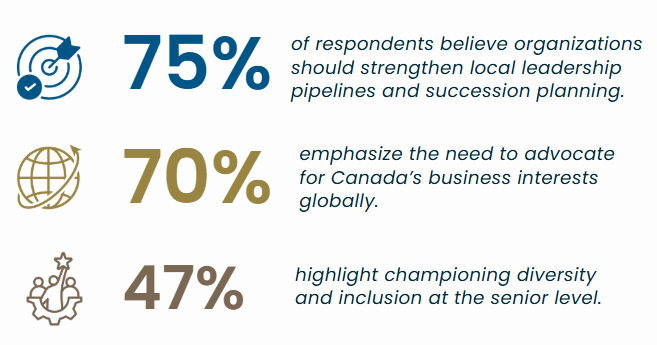
Impact on Talent
The message from executives is clear: leadership development is not optional — it is a necessity.
There is strong alignment across the executive community that leadership development must be an enterprise-wide priority. Building resilient talent pipelines, rewarding future potential over traditional tenure, and preparing leaders to operate across sectors and borders are now viewed as core responsibilities, not optional efforts.
Succession planning, in particular, is being reframed from a reactive exercise to a proactive strategy focused on long-term organizational health.
Simultaneously, executives are calling on Canadian firms to elevate their global voice. Promoting Canadian leadership talent abroad and advocating for the country’s business interests is seen as essential to competitiveness.
Inclusion, too, must move beyond stated values into visible leadership action. As ESG, trust, and ethics become global standards, inclusive and credible leadership will serve as a cultural asset and business advantage.
Key Takeaway from Our Executive Network
The future of leadership must be built deliberately. Firms are being called to lead both at home and abroad by growing talent pipelines, modeling inclusive practices, and championing Canada’s role in the world.
Strategic Growth, Innovation, and Resilience: The New Leadership Mandate
What leadership skills are most critical for Canadian financial services executives to navigate today’s market challenges?
- 78% of executives identified a strategic growth and innovation mindset as the top leadership skill.
- This was followed by crisis management and resilience (65%), and regulatory and risk management expertise (51%).
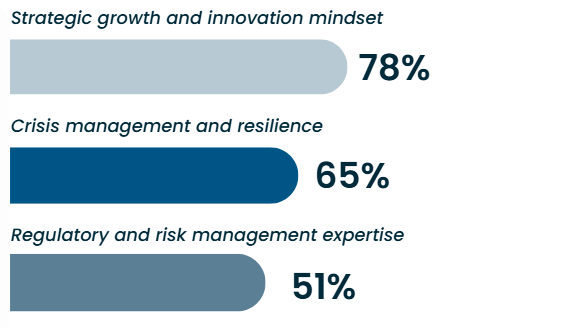
Impact on Talent
Modern financial services leadership is defined by the ability to lead through disruption with both vision and control.
Executives are expected to drive innovation and strategic growth while simultaneously navigating heightened risk, regulatory complexity, and operational pressure.
As respondents noted, crisis management is no longer a niche skill; it is integral to executive performance, particularly in environments shaped by interest rate volatility, cyber threats, and geopolitical uncertainty.
What emerges is a unified leadership profile — one that combines measurable innovation with steady crisis response, values-driven decision-making, and disciplined governance. In this evolving landscape, the most effective leaders will be those who can deliver transformation without losing sight of trust, stability, or institutional accountability.
Key Takeaway from Our Executive Network
Today’s leaders must embrace both ambition and accountability — driving change while navigating risk with clarity and confidence.
Agility and Alignment: Rethinking Executive Hiring in a Shifting Market
How have recent geopolitical and economic shifts influenced your organization’s executive hiring and talent strategies?
- 56% of respondents reported a greater emphasis on leadership agility and crisis preparedness.
- 35% reported no significant changes to talent strategy.
- 13% are placing increased focus on Canadian-based executive talent.
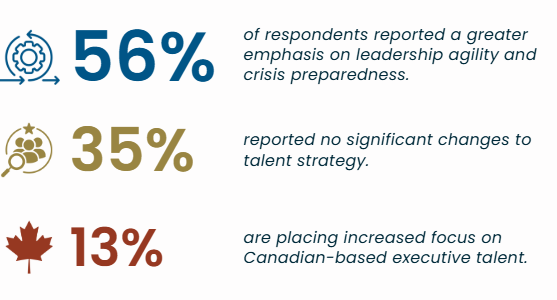
Impact on Talent
The findings above point to a sector in transition.
While over half of respondents are actively evolving their executive hiring lens to prioritize agility, resilience, and cultural alignment, a sizable portion of organizations report little or no change. This uneven response highlights a strategic divide between those preparing for long-term volatility and those maintaining legacy approaches in a shifting market.
For organizations leaning into agility, the focus is clear: identify leaders who thrive in ambiguity, adapt quickly, and align with organizational values.
As global mobility becomes more complex, Canadian-based talent is also gaining prominence. Yet, organizations that fail to adjust may face growing risk. In particular, misalignment between leadership capabilities and future demands can result in missed opportunities or stalled transformation.
Key Takeaway from Our Executive Network
Leadership agility is quickly becoming a hiring baseline. Organizations must balance continuity with future readiness or risk being left behind.
Canada’s Talent Position: Strengths and Gaps
What do you see as Canada’s greatest advantage in attracting and retaining top executive talent?

Others pointed to quality of life, safety, and political climate as important differentiators.
Impact on Talent
Canada’s reputation for regulatory strength, governance, and quality of life continues to be a powerful draw for executive talent.
These attributes offer a sense of stability, especially in today’s uncertain geopolitical environment. For many leaders, Canada represents a safe and attractive place to live, work, and build a long-term career.
But these advantages, while enduring, may no longer be enough. Several respondents noted that Canada’s risk-averse culture and limited entrepreneurial incentives could hinder its appeal to world-class, globally mobile leaders.
To remain competitive, Canada must do more than offer safety — it must offer opportunity. A stronger economic narrative, clearer investment pathways, and bold leadership mandates are needed to strengthen Canada’s positioning as a global talent destination.
Key Takeaway from Our Executive Network
While Canada’s stability remains a key draw for talent, the country must strengthen its entrepreneurial ecosystem and modernize its leadership narrative to remain globally competitive.
Confidence in Canada’s Financial Competitiveness
How confident are you in Canada’s financial competitiveness?
- 48% of executives are somewhat confident in Canada’s ability to remain a global financial hub.
- 34% are very confident; 10% are not confident, citing policy stagnation, innovation gaps, and regional disconnection.
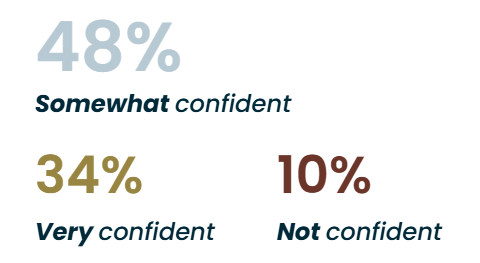
Impact on Talent
Executives express cautious optimism about Canada’s future as a global financial hub.
While fundamentals like regulatory strength and quality of life remain intact, many respondents view Canada’s long-term competitiveness as increasingly dependent on strategic government action.
There is a clear call for stronger alignment across provinces, modernized regulation, and policies that actively support innovation and cross-border investment. Without meaningful change, there is concern that Canada could fall behind more agile financial centers.
While ESG leadership and inclusive values offer reputational strength, they must be backed by economic policy and institutional coordination to truly elevate Canada’s role on the world stage.
Confidence, in this context, is not passive – it must be continuously earned through decisive leadership and bold action.
Key Takeaway from Our Executive Network
Confidence in Canada’s financial future exists, but it hinges on leadership alignment, strategic policy and government direction, and an innovation agenda that matches global ambition.
Looking Ahead
A Mandate for Action
The results of our proprietary survey point to clear imperatives that organizations, and leaders, can act on now to prepare for the challenges and opportunities ahead.
The shifts reshaping executive leadership are as follows:
Adaptability must drive hiring decisions. Agility, resilience, and alignment with organizational purpose are no longer nice-to-haves — they are non-negotiables.
Accountability must match innovation. Visionary leadership means little without execution rooted in trust, discipline, and results.
Succession planning demands greater urgency. Future-ready pipelines of Canadian talent requires deliberate, long-term development rather than reactive backfilling.
À propos de Massey Henry
Executive Search, Coaching, Assessment, and Advisory Services

Michael Henry
Managing Partner, Massey Henry

John Sanders
Senior Partner, Board & CEO Services

Lisa Newey
Partner

Alex Bunyan
Partner & Head, Leadership Practice

